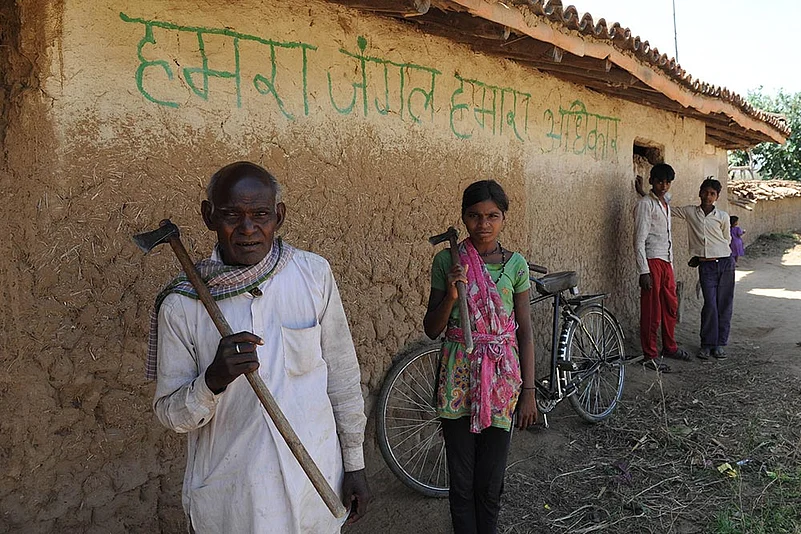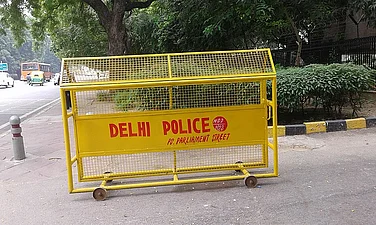Over a decade after he applied for land under the Forest Rights Act (FRA), Achyut Pujari (50) is yet to receive an official word on the fate of his application. Nor has he heard about the February 13 Supreme Court order asking state governments to evict those whose claims under the FRA have been rejected. Blissfully oblivious of what is happening in government offices and courts far away from the remote place he lives in, Pujari has continued to plough his small, 1.5-acre piece of land, growing paddy, moong and urad.
The Gond tribal in Jamjharan village of Odisha’s poverty stricken Kalahandi district is shattered when the news about the apex court order is broken to him by Outlook. But he doesn’t grope for an answer even for a second when asked what he would do if forced to vacate the land. “What can we do? We will all commit suicide,” he says.
Achyut is a father of three. His eldest child, a daughter, is already married while he lives with younger daughter Tikemani (15) and son Girishankar (12) and wife Mangala. He says he has no livelihood option other than the land he cultivates since there is no work available in the area.
Under the top court’s orders—which came on a decade-old petition challenging the constitutional validity of the Forest Rights Act, 2006—more than one million families of Adivasis and other forest-dwellers are facing eviction from forestlands across 16 states. The act, which enables communities the right to live and sustain their livelihood in forests and protect and manage their traditional land, has been a sore point for long.
Elsewhere in Kalahandi, Kantha Jal doesn’t know what he would do in case he is evicted. Like Achyut, this non-tribal classified as ‘other traditional forest dweller’ (OTFD), had also filed his application in 2008 for rights over the five acres of land his family has been in possession of for centuries under FRA. He doesn’t even know the grounds on which his claim was rejected.
A village ‘vaidya’ (traditional healer) by vocation, this 62-year old from Kanakpur village protects the local forest along with other members of the gram sabha. He is unable to reconcile with the fact that he would be evicted from the place his family has been living in for centuries and is hoping for some miracle that would save his dwelling place.
There are nearly 1.5 lakh people like Achyut and Kantha in Odisha. Given that a 6.12 lakh people had had applied for land in the state under FRA, it means that one in every four application was rejected. This doesn’t speak very highly of a state government that never tires of boasting that it is the ‘best performing’ state when it comes to implementation of FRA. With this background, the ST/SC development minister Ramesh Majhi’s assurance that “we would take necessary measures to protect the interests of the tribals” sounds rather hollow.
Pravat Kumar Mishra from the Regional Centre for Development Cooperation (RCDC), an NGO working for forest rights, says organisations are now in the process of weighing various options, including filing a review petition in the Supreme Court. But he is distraught that all the hard work done by RCDC and other organisations over the years in facilitating the processing of thousands of applications has gone down the drain. “The wheel has been turned back. Worse still, it would deter potential and rightful claimants from filing claims for land under FRA. In effect, this order would sound the death knell of the historic FRA,” he says.

Activists are also dismayed that the central government failed to defend FRA in the court effectively. Shankar Gopalakrishnan, secretary of the Campaign for Survival and Dignity, a national platform of forest dwellers groups, says that the government opted not to open its mouth for the hearing in the SC. “Our lawyers were present on court that day for the hearings. What was the central government’s reply when the claims were rejected?,” he says, adding that tribal affairs ministry, nodal agency for implementing FRA, can’t absolve itself from the responsibility of defending the law in the court.
Arguing that the matter is in the purview of states, ministry of tribal affairs secretary Deepak Khandekar says the allegations are baseless. “The SC did not ask anything from the central government. It wanted to see the affidavits filed by various state governments,” he says.
Activists also describe the SC order as unconstitutional, as it ignores the centrality of gram sabha and its constitutional agency in matters of forest rights recognition, including rejection of claims. They argue that Rule 12(A) of the law states that “no committee except the gram sabha or the Forest Rights Committee shall be empowered to receive claims or rej-ect, modify, or decide any claim on forest rights”.
Prafulla Samantra, who led the Dongria Kondh tribe in Odisha’s Niyamgiri Hills to win a 12-year-long legal battle, says that it’s the FRA that protected the tribes from losing their livelihood to a mining project of multinational bauxite giant Vedanta. Samantra later won the Goldman environmental prize for his efforts. “The Niyamgiri mining was stopped because of FRA and the gram sabha,” says Samantra. “The Dongria Kondh tribe is prepared to fight the battle this time too”.
Ashok Choudhary of the All India Union of Forest Working People says that as the implementation of FRA on the ground is slow in most states, the order will only derail it further. “Our worry is that in the process of claiming and reclaiming, the forest right law becomes dysfunctional. The whole thing of FRA implantation will be disturbed by this order. No governments are interested in implementing the law because it doesn’t give any power to them,” says Choudhary, adding that the number of evictions may cross 20 lakhs, once all the state governments submit their claims.
Activists claim that the largescale rejection of land ownership application claims are taking place in the interests of corporate houses and development projects. Lippa village in Himachal Pradesh, which has been fighting against a hydel power project for the last 10 years, saw rejection of 47 claims. The rejections were made on untenable grounds, claims Manshi Asher, activist with Himdhara. “The state government has been trying to get exemption from gram sabha for the NOC clause. The land has been leased out to a company without an NOC while a case is pending in the high court,” says Asher.
With general elections round the corner, the issue is generating political heat and most of the parties are jumping into the bandwagon. Chhattisgarh chief minister Bhupesh Bagel has announced that all the cancelled claims will be re-examined after Congress president Rahul Gandhi asked the government to do so. BJP president Amit Shah also promised that BJP-led states will look into the matter.
Gangaram Paikra, a tribal rights activist in Surguja region of North Chhattisgarh, says that the order could have negative impact on Particularly Vulnerable Tribal Groups (PVTGs) of the state. “A majority of PVTGs like Pahadi Korva, Birhor, Abujmadiya and others who are among most backward tribes have not applied for land under the FRA,” he said.
Citing major flaws in the execution of FRA, Gautam Bandopadhyay, convener of Nadi Ghati Morcha, says the most unsettling part is that the highest number of claims were made only in those regions where tribal leaders or NGOs were active. “Tribes actually living in interior parts of the state who should be benefited through FRA have been left out in large numbers. The last government had not played a pro-active role in getting the forms filled, he said.
***
- Activists are dismayed that the central government failed to defend FRA in the Supreme Court effectively.
- Activists describe the SC order as unconstitutional, as it ignores the centrality of the gram sabha.
- With elections around, the issue is generating political heat with most of the parties are jumping into the bandwagon.
By Preetha Nair in Delhi, Sandeep Sahu in Bhubaneswar and Ankit Mishra in Raipur


























